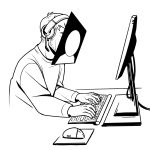INTRODUCTION
We are pleased to present the seventh and final excerpt from Futures: A Science Fiction Series—this time from Milo (01001101 01101001 01101100 01101111) by Alexander Pyles.
The title character seeks a release from his lifelong chronic illness. His friend discovers a miracle that offers a second chance, but is it too good to be true? Milo explores the relationship between disability, technological progress, and the cost of our society’s emphasis on corporeal normalcy.
…
MILO (01001101 01101001 01101100 01101111)
by Alexander Pyles
Am I whole?
Am I a person?
I can’t help but ask these things as I trace the curvature of my new face in the LED light of my bathroom. The surface of my face is cool and hard, or am I imagining it? These sensations are not my own anymore. My hand is nothing but well-timed gears and tubes, interlocking, connected to wires and cords spliced directly into my cerebellum. The sense of feeling textures is all caught up in the psychosomatic now. Solely haptic feedback.
“Is this what I 01110111 01100001 01101110 01110100 01100101 01100100[wanted]?” I finally say aloud. Even the sound of my voice is strange—clipped and sterile. Reminds me of a hospital intercom.
No one answers my question. I am alone after all. I let the silence fill in the blanks.
I look back at the now useless wheelchair in the corner and accuse it with my eyes. Are they eyes or sensors? They’re radiant quarter-sized disks. They glow white and stare at the outdated, offensive piece of metal and canvas, a concrete reality of my illness and what informed my decision. The new body.
…
“How goes it, Milo?” My cheery friend, Darius, greeted me coming up the sidewalk. He was the only person who would talk to me, even as I languished in the chair.
“You know, same old, same old,” I said, falling into our usual verbal dance. I flashed him my best I-want-to-die smile and he continued down the street towards his work. I placated Darius and he could go about his day, carefree, without worrying about my mental health.
No one else seemed to want to talk to someone like me. My body did not fit the mold that was pushed on me. On the surface, I seemed fine. I got looks that affirmed this. Their eyes asked, “Why don’t you just walk? Why don’t you just get out of that chair?” They didn’t know that I was dying from the inside out.
No, not cancer or some sort of exotic, rare disease. The illness was purely happenstance. As average and common as milk. A birth defect. A genetic lottery where I lost and lost hard. It was a nerve disease. One that most people weren’t aware of. All I could do was wait for the creeping deterioration to eventually take my life away. Euthanasia was casually suggested during doctor visits or at routine checkups when I was younger. My parents refused. They had already fought a war to keep me from being aborted. The doctors almost wrote a petition. My parents won, but did I?
Not really. I told them I wanted to die. I knew I would hate the chair. It would be a prison. My father only shook his head and told me that suffering was good for the soul. Fuck that. Chances were I could never work up the nerve to end it anyway, and in my current state, I doubt it would even be possible.
And as if my physical state hadn’t been enough, my father died by some irony unknown to me and I felt like I had to carry on with the time he seemingly bought me. Simple as that, right?
I thought simply surviving was my only option, but every day I wondered if there might be a way out.
…
“Milo, you need to see this,” Darius said as he grabbed his phone from his pocket. A decade ago, phones were thick slabs of tech. Now they were these thin sheets of plastic and metal, still opaque black.
“What now?” I asked. There were so many “miracle” cures out there that I had become embittered to them. Hopes can only be dashed so many times before you become resigned to an expiration date.
“Two words: robot body.”
“Fuck outta here.”
“No. This is it.” Darius flicked through the images his phone projected onto the wall in front of us. A news story about the latest breakthrough in robotics—and my cure.
“Okay, becoming like some retro Terminator or Andy is cool and all, but what does this have to do with me? I’m not a gearhead.” Gears were tuned into implants and other cybernetic enhancements, like something out of an old sci-flick. I wish I could have tapped my foot like I’d seen some annoyed people do.
“You aren’t actually looking.” The guy was relentless with his optimism, but he did always find the silver linings to my dark moods. His faux-naiveté served him. I hated him for it, the willful ignorance, but he was one of the few people who saw past the disease.
“Fine, I’ll give it a good look, for your sake,” I said. Maybe that would buy me a month without him bringing up another inane cure.
The news flashed images of new automatons and various robot parts that seemed human, but were decidedly not. The parts were too thin, streamlined, entirely other.
The images switched to a hospital room where a body was laid out. I couldn’t tell if it breathed, but the doctors were seemingly fitting the robotics to the flesh. Another skip and the metal chassis was part of a person who breathed and now walked right out of the room. They strode on two robotic legs. Uncanny.
“This is bullshit, Dar,” I said. “There isn’t a chance in hell that you’re getting me into something like that. No way.”
“Let’s see if we can. Let’s just see.”
…
Upon arriving at the facility, I found out that the flesh in the video was synthetic. The commercial had left that part out. It wasn’t a partial job. It was an entire reset. A reboot. An upgrade. A rebirth.
Brain out. Brain in.
Now, here I was. Standing for the first time. In a hospital bathroom. In a new body. My body. Even my face is merely a formed image, projected from various emitters. The surgery—or fabrication, really—was radical. Revolutionary. Utterly perverse. But then, my only requirement was to walk again. This was the only way for me. It was surefire. It was 01000100 01101111 01101110 01100101[done].
…
ABOUT THE AUTHOR
Alexander Pyles is a short story author, novelist, and reviewer. His shorter work has appeared on 101words.org, Zathom.com, and in the River & South Review.
See more of his work at pylesofbooks.com.
…
If you enjoyed this excerpt, we hope you will purchase the book to read the story in its entirety. Or purchase the box set and get all seven stories in the series!





